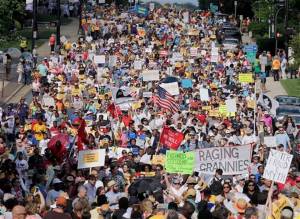Closing arguments are scheduled for Friday, July 31, in U.S. Middle District Court in the controversial voting rights trial where plaintiffs seek to overturn North Carolina’s controversial Voter Identification and Verification Act.
North Carolina N.A.A.C.P, the League of Women Voters, the A.C.L.U and others will have two hours to present their closing arguments in the three-week long trial in which they sued Gov. Pat McCrory and the state charging that V.I.V.A discriminate against African-Americans and other minority groups.
Plaintiffs charged the law is biased against minority groups by placing several roadblocks to voting including eliminating same-day voter registration, reducing the days of early voting from 17 to 10, ending preregistration for 16 and 17 year-old and prohibited out-of-precinct provisional voting.
The state has argued during the trial that the law does not discriminate against blacks, but, strengthens the integrity of the voting process by protecting citizens against voter fraud.
It has attracted international media attention, and was closely watched by legal scholars, activists, and politicians. Also, Dr. William Barber, president of the N.C. N.A.A.C.P and leader of the Moral Monday Movement, led three thousands demonstrators through downtown Winston-Salem to bring attention to the start of the trial.
On Thursday, the courtroom was packed with spectators who expected closing arguments, however, the testimony of Brian Neesby, business system analysts for the State Board of Elections, was sharply questioned over his methodology used to analyze mail failure rates between same-day voters and those of traditional voters. Allison Riggs, one of plaintiff’s attorneys, argued that failure rates among same-day voters were lower than traditional registrants.
Dr. Alan Lichtman, a Distinguished Professor of History at American University, was called back to the stand to rebut much of testimony offered by Neesby.
Judge Thomas Schroeder is not expected to rule on the case for several months.





